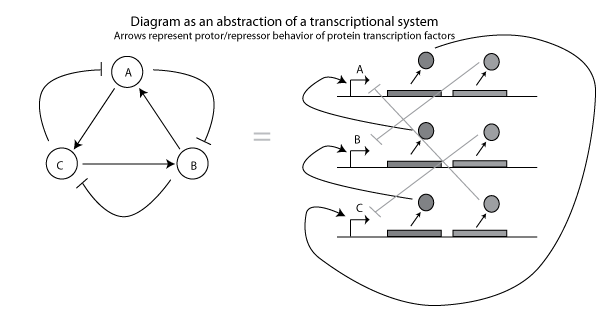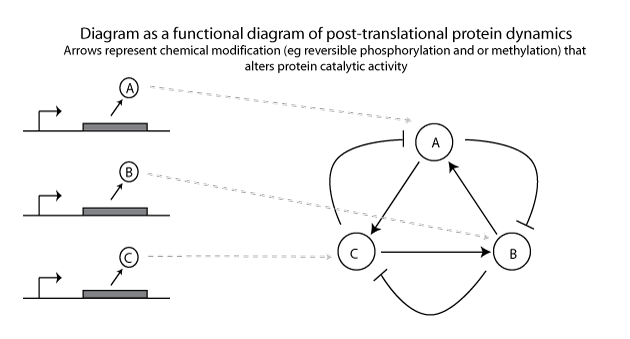IGEM:Harvard/2006/Transcription vs Protein circuits: Difference between revisions
No edit summary |
No edit summary |
||
| Line 2: | Line 2: | ||
The forward "activation" arrows establish a net forward movement, and the back "repression" arrows prevent the circuit from reaching steady state with all elements "on". | The forward "activation" arrows establish a net forward movement, and the back "repression" arrows prevent the circuit from reaching steady state with all elements "on". | ||
[[Image: | [[Image:abstract_circuit.gif]] | ||
But what do these arrows actually mean? One could imagine that the arrows represent transcription factor activity. Each circle represents an operon that produces proteins that repress or promote transcription of other operons. | But what do these arrows actually mean? One could imagine that the arrows represent transcription factor activity. Each circle represents an operon that produces proteins that repress or promote transcription of other operons. | ||
[[Image: | [[Image:transcription_circuit.gif]] | ||
This is the basis for synthetic circuits such as the Ellowitz repressilator. However, it appears that many biological oscillators, such as the KaiA/B/C system of cyanobacteria, do not create oscillations merely from transcriptional dynamics. | This is the basis for synthetic circuits such as the Ellowitz repressilator. However, it appears that many biological oscillators, such as the KaiA/B/C system of cyanobacteria, do not create oscillations merely from transcriptional dynamics. | ||
| Line 12: | Line 12: | ||
Instead, transcription remains constant and it is the catalytic behavior of proteins that oscillates, based on post-translational modifications such as phosphorylation or methylation. | Instead, transcription remains constant and it is the catalytic behavior of proteins that oscillates, based on post-translational modifications such as phosphorylation or methylation. | ||
[[Image: | [[Image:posttranscription_circuit.gif]] | ||
Revision as of 12:36, 18 June 2006
It is pretty easy to see that the following circuit will produce an oscillator. The forward "activation" arrows establish a net forward movement, and the back "repression" arrows prevent the circuit from reaching steady state with all elements "on".
But what do these arrows actually mean? One could imagine that the arrows represent transcription factor activity. Each circle represents an operon that produces proteins that repress or promote transcription of other operons.
This is the basis for synthetic circuits such as the Ellowitz repressilator. However, it appears that many biological oscillators, such as the KaiA/B/C system of cyanobacteria, do not create oscillations merely from transcriptional dynamics.
Instead, transcription remains constant and it is the catalytic behavior of proteins that oscillates, based on post-translational modifications such as phosphorylation or methylation.


